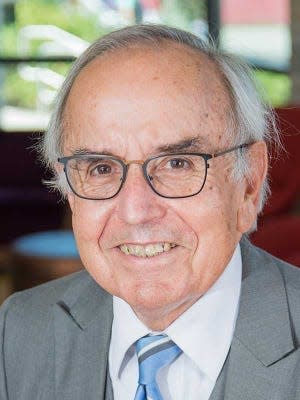Arthur Cyr: JFK’s arms control treaty remains major milestone
- Oops!Something went wrong.Please try again later.
- Oops!Something went wrong.Please try again later.
- Oops!Something went wrong.Please try again later.
- Oops!Something went wrong.Please try again later.
- Oops!Something went wrong.Please try again later.
“I speak … in a spirit of hope,” said President John F. Kennedy, beginning a policy address to the nation on July 26, 1963. He went on to describe a major breakthrough in the Cold War. The new Limited Nuclear Test Ban Treaty with the Soviet Union would prohibit nuclear explosions in the atmosphere.
This followed the Cuban Missile Crisis of the previous October, which had brought the world to the very edge of general nuclear holocaust. The two events are related and directly germane to our international leadership — or lack thereof — today.
Under the treaty, the Soviet Union and the United States as well as Britain agreed to renounce testing nuclear weapons in the atmosphere, in outer space and underwater. The treaty did not ban underground tests. Compliance could be monitored without onsite inspection, which Moscow opposed. The treaty was signed on Aug. 5.
Cancer and other diseases resulting from nuclear radiation were well known. The intensity of Cold War political fears and hostility can be measured by the fact that leaders and the public nonetheless had generally supported such tests.
Fear has always been an enormously powerful, and often destructive, motivation — for nations as well as individuals. During the 1956 presidential campaign, Democratic nominee Adlai Stevenson courageously proposed ending nuclear tests in the atmosphere. Republican vice president Richard M. Nixon immediately denounced this as “catastrophic nonsense.”
In the earlier 1952 campaign contest, Nixon described the beleaguered Stevenson, well behind in opinion polls, as “Adlai the appeaser” and a graduate of Dean Acheson’s “cowardly college of containment.” Nixon’s nasty attack anticipated the even cruder style of his own ultimately disastrous vice president, Spiro Agnew. Acheson, President Truman’s secretary of state, was widely criticized for the bloody, frustrating and unpopular Korean War, and for the policy of foreign policy restraint known as containment.
The 1952 Republican platform called for “rolling back” communism by liberating Eastern Europe. General Douglas MacArthur, commanding forces in Korea, advocated using nuclear weapons against China. Dwight Eisenhower, the general who achieved the White House, deftly managed this Republican right wing the way the bullfighter manages the bull.
Kennedy showed courage and deserves credit for successfully seeking to limit nuclear tests. The treaty was a direct function of his increased standing resulting from the Cuban Missile Crisis, and willingness to engage in shrewd — and effective — political horse-trading.

After a terrible tense week of nuclear confrontation over Cuba, Soviet leader Nikita Khrushchev agreed to withdraw strategic missiles. Unknown until years later, Kennedy in exchange secretly pledged to remove U.S. missiles from Turkey.
To secure Senate approval of the new treaty, JFK worked hard to achieve the agreement of Senator Everett Dirksen (R-IL), the Republican minority leader. Up until their accord, Dirksen had been a visible opponent of the arms treaty. His classic rhetoric passionately advocating for the treaty on the Senate floor was instrumental in passage by a vote of 80-19.
The Test Ban Treaty provided important fresh momentum to long-term nuclear arms control efforts. Earlier, Eisenhower achieved demilitarization of Antarctica, and the neutralization and reunification of Austria. The 1968 Nonproliferation Treaty, 1972 SALT (Strategic Arms Limitation Talks) Treaties and others built on earlier progress.
Pragmatism combined with engagement in dealing with Congress and Moscow was the key to Kennedy’s success. That approach contrasts with today’s often rigid partisanship and unyielding policy commitments in both parties.
The Cuban Missile Crisis and resulting arms control treaty remain highly instructive regarding leadership.
— Arthur I. Cyr is the author of “After the Cold War.” Contact him at acyr@carthage.edu.
This article originally appeared on The Holland Sentinel: Arthur Cyr: JFK’s arms control treaty remains major milestone
